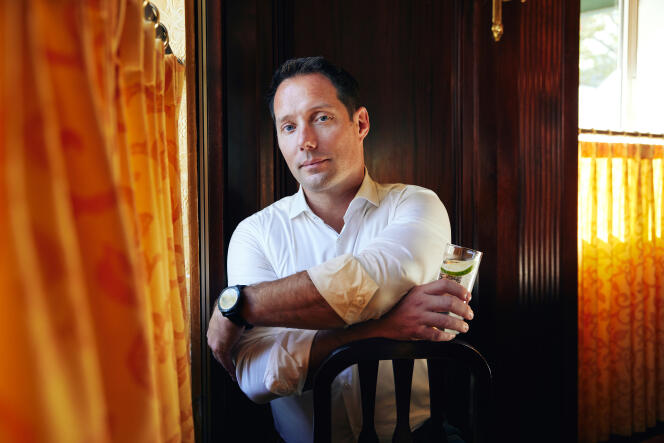What is immediately striking when we see Thomas Pesquet is his athletic physique, his pectorals that make the buttons of his impeccably ironed white shirt pop. Like everyone else, we knew his ideal son-in-law’s face, Pacific Ocean blue eyes and a good guy’s smile, but we had not realized that a good part of the astronaut’s job was to maintain a competitive body at all costs. . Eye weakness? Caries ? A hearing problem? You are now released from the program. We don’t joke around in the world of astronauts. We suspected it, but, upon reading his autobiographical book, My life without gravity (Flammarion, 380 pages, 24 euros, published October 18), there is, contrary to what the title suggests, little room for levity in the race for the stars.
When we find him at La Closerie des Lilas, a legendary restaurant in the Parisian district of Montparnasse, Pesquet orders a Perrier rondelle. Normally, someone who describes themselves as “geographic single” – his partner, Anne, lives and works in Rome, for the Food and Agriculture Organization of the United Nations, he, in Germany – happily enjoys a drink with colleagues after work. But this morning he only had time to run eight kilometers, so there was no question of dousing himself with alcohol. He kindly asks the waiter for a table out of sight. Not that he mind signing autographs, but he’s getting used to it enough to know he could spend the night there. He came from Cologne, where he still works for the European Space Agency (ESA). Because Thomas Pesquet, 45 years old, is not content with being the first Frenchman to have already been selected for two missions (Soyuz and SpaceX), accumulating 396 days, 11 hours and 34 minutes in orbit: he is training hard -foot to land a third. A madman.
When you read and listen to it, frankly, it doesn’t really make you want a space adventure. Between his selection, in 2009, and his takeoff from the Baikonur cosmodrome (Kazakhstan), in 2016, the young Pesquet, an aeronautical engineer turned pilot at Air France, worked like hell, all without being assured of one day being chosen to get on the rocket. In his place, let’s put it bluntly, we would have given up a long time ago.
A diaper in the diving suit
Flight, a horror – especially for those who remain on the ground, family and friends, the astronaut readily admits. “When you say “goodbye” to them, you don’t know if you’re going to find them again. » The statistics are stubborn: 5% risk of staying there. From below, the image is anxiety-inducing to say the least: a giant stick of dynamite that would catch fire. Inside, fifty-four hours of gritting your teeth in three people in 3.5 square meters, a diaper in a diving suit that makes you look like a Teletubbies, a “corridor” 80 centimeters in diameter to get out of the room. capsule: claustrophobics refrain. Arriving on the International Space Station, things aren’t getting any better in terms of comfort. For insomniacs, help: you have to sleep with your pillow hanging on your head and without a blanket because of the absence of gravity, and enjoy sixteen sunsets and sunrises per twenty-four hours. When it comes to hygiene, we don’t draw a picture for you: wash with a wipe, a pair of underwear every two days, two pairs of socks per week, and it’s better not to miss it when you go to the toilet (10 centimeters in diameter).
You have 55.68% of this article left to read. The rest is reserved for subscribers.
